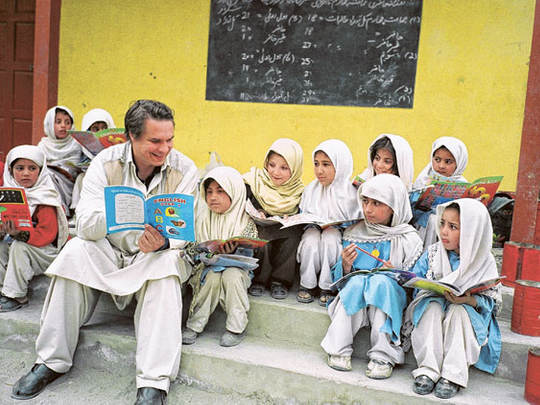
Greg Mortenson stumbled into the village of Korphe in 1993 to recuperate after failing to reach the summit of Pakistan's towering K2 mountain.
He had organised the climb in memory of his sister who died the year before. Christa had endured a life-long battle with epilepsy.
During his recuperation, he noticed some children writing in the dust on the ground with sticks. This, he realised, was their class — their lesson and their school were non-existent.
He promised to return to the remote village in the Pakistan side of the Karakoram mountain range and build these children a school.
Eighteen years later, Mortenson's Central Asia Institute (CAI) has established more than 178 schools in rural Afghanistan and Pakistan; supports more than 1,200 teachers; and has educated 64,000 students, including 52,000 girls.
The biggest challenge is "the West and its ignorance", Mortenson told Weekend Review during the Emirates Airline Festival of Literature earlier this year. "I say ignorance breeds hatred. It's also all over the world, and it's been difficult for me to understand why people judge by their 1 per cent of differences," he said.
The humanitarian works with many children around the world and tries to spread the message that "we're all the same; we have the same hopes, fears, aspirations and joys, but we keep fighting about our 1 per cent of differences".
In 2008, Unicef statistics estimated the female adult literacy rate (as a percentage of male) in Afghanistan to be 29 per cent.
The literacy rate of men between 15 and 24 years of age (2003 to 2007) was 49 per cent, as compared to just 18 per cent for Afghan women of the same age.
Generally, there are three issues affecting the education of women in Pakistan and Afghanistan, according to Mortenson: war; physical isolation/remote area; and religious extremism.
Despite these issues, the schools are still being built and some of the first wave of literate women from CAI-built schools are now graduates and are working.
Several heart-warming stories of success and triumph are chronicled in the humanitarian's books Three Cups of Tea: One Man's Mission to Promote Peace … One School at a Time (2006, with co-author David Oliver Relin) and Stones into Schools: Promoting Peace with Books, Not Bombs, in Afghanistan and Pakistan (2009).
The title Three Cups of Tea refers to a saying by Haji Ali, a Korphe village chief of the Karakoram mountains. In Pakistan and Afghanistan, the chief said, they drink three cups of tea to do business: in the first you are a stranger, in the second you become a friend and in the third you join our family, and for our family we are prepared to do anything — even die.
Shakeela — one of the non-profit CAI's students — was the first in her valley to get higher education. Her father was the first literate man in the valley. After passing her medical exams last year in Lahore, she became the first female physician in 1.2 million people from her native Baltistan. It probably cost about $2,000 (Dh7,300) in total to get Shakeela through medical school, Mortenson said. "Now she'll save hundreds of lives."
Of all his time spent in the turbulent countries, it is not visiting them that really concerns him but the threats he has received in his own country.
"If I'm in Afghanistan and someone threatens my family in Montana, then I'll want to go home to protect them," he said. "When I'm in the United States, people are shocked when I tell them about the power of a girl's education and what Islam is really about; that these are not terrorists or bad people. Every day I have to face that [the issue] and it's difficult to tackle that."
Pennies for Peace
In 1994, students at the Westside Ele-mentary School, River Fall in Wisconsin, raised 62,345 pennies on the back of their own initiative. A US penny is just one cent (one hundredth of a dollar) but the total amount donated for helping build Mortenson's first school in Pakistan was $623.45.
Now the Pennies for Peace programme is implemented in hundreds of schools worldwide and not only raises money for poverty-stricken children but also teaches the children collecting the money to be philanthropists.
Mortenson said children taking part in the programme don't necessarily have to collect for them but whichever country they choose. "International interest and significant support" has led to the Pennies scheme being registered and the CAI is also now looking into having the programme registered in the UAE.
One of his most enduring memories from his work with the rural communities in the two countries is when a child writes. "When a child writes their name, I feel this transformative event; they have an identity, they belong in the world."
Having come so far since his initial disappointment at not reaching the summit of K2, how does Mortenson think Christa would react to his work?
"She would be working with me," he said with moist eyes. "Part of what drives me is her memory."








